Fluid and Electrolytes Study guides, Class notes & Summaries
Looking for the best study guides, study notes and summaries about Fluid and Electrolytes? On this page you'll find 69 study documents about Fluid and Electrolytes.
Page 4 out of 69 results
Sort by
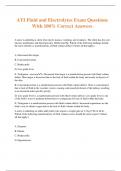
-
ATI Fluid and Electrolytes Exam Questions With 100% Correct Answers
- Exam (elaborations) • 9 pages • 2024
- Available in package deal
-
- $11.49
- + learn more
ATI Fluid and Electrolytes Exam Questions With 100% Correct Answers A nurse is admitting a client who reports nausea, vomiting, and weakness. The client has dry oral mucous membranes and blood pressure 102/64 mm Hg. Which of the following findings should the nurse identify as manifestations of fluid volume deficit? (Select all that apply.) A. Decreased skin turgor B. Concentrated urine C. Bradycardia D. Low-grade fever E. Tachypnea - answerA; Decreased skin turgor is a manifestation pre...
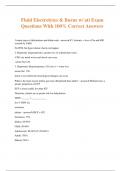
-
Fluid Electrolytes & Burns w/ ati Exam Questions With 100% Correct Answers
- Exam (elaborations) • 19 pages • 2024
- Available in package deal
-
- $12.49
- + learn more
Fluid Electrolytes & Burns w/ ati Exam Questions With 100% Correct Answers 3 major types of dehydration and define each - answer1. Isotonic: = loss of Na and H20 (caused by V&D) Na WNL but hypovolemic shock can happen 2. Hypotonic (hyponatremic): greater loss of sodium than water. -CM's are much worse and shock can occur -serum Na<130 3. Hypertonic (Hypernatremic): NA loss is < water loss. serum Na> 150 shock is less likely but neurological changes can occur What is the main...
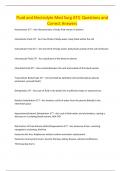
-
Fluid and Electrolyte Med Surg ATI| Questions and Correct Answers
- Exam (elaborations) • 18 pages • 2024
-
- $13.19
- + learn more
Homeostasis 277 - Ans Characteristics of body fluid remain in balance Intracellular Fluid 277 - Ans Two-thirds of body water, body fluids within the cell Extracellular Fluid 277 - Ans One-third of body water, body fluids outside of the cell membrane Intravascular Fluid 277 - Ans Liquid part of the blood or plasma
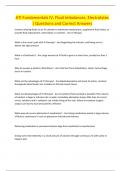
-
ATI Fundamentals IV, Fluid Imbalances, Electrolytes | Questions and Correct Answers
- Exam (elaborations) • 15 pages • 2024
-
- $13.19
- + learn more
Involves infusing fluids via an IV catheter to administer medications, supplement fluid intake, or provide fluid replacement, electrolytes or nutrients - Ans IV therapy What is the nurse's part with IV therapy? - Ans Regulating the infusion, and being sure to deliver the right amount What is a fluid bolus? - Ans Large amount of IV fluid to give in a short time, usually less than 1 hour
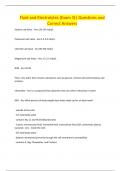
-
Fluid and Electrolytes (Exam 3)| Questions and Correct Answers
- Exam (elaborations) • 13 pages • 2024
-
- $13.19
- + learn more
Sodium Lab Value - Ans 135-145 mEq/L Potassium Lab Value - Ans 3.5-5.0 mEq/L Chloride Lab Value - Ans 98-106 mEq/L Magnesium Lab Value - Ans 1.5-2.5 mEq/L BUN - Ans 10-20 Fluid - Ans water that contains substances such as glucose, mineral salts (electrolytes), and proteins
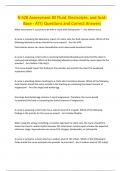
-
N 528 Assessment #2 Fluid, Electrolyte, and Acid- Base - ATI| Questions and Correct Answers
- Exam (elaborations) • 20 pages • 2024
-
- $13.19
- + learn more
What assessment is a priority to do with a client with Dehydration ? - Ans Mental status A nurse is reviewing the laboratory report of a client who has fluid volume excess. Which of the following laboratory values should the nurse expect? - Ans Hct 34% Fluid volume excess can cause hemodilution and a decreased hematocrit level A nurse is assessing a client who is receiving hydrochlorothiazide and notes that the client is confused and lethargic. Which of the following laboratory values shoul...
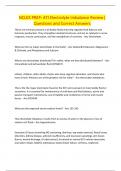
-
NCLEX PREP: ATI Electrolyte Imbalance Review| Questions and Correct Answers
- Exam (elaborations) • 5 pages • 2024
-
- $12.49
- + learn more
These are minerals present in all bodily fluids that help regulate fluid balance and hormone production. They strengthen skeletal structures, and act as catalysts in nerve response, muscle contraction, and the metabolism of nutrients - Ans Electrolytes What are the six major electrolytes in the body? - Ans Sodium& Potassium, Magnesium & Chloride, and Phosphorus and Calcium Where are electrolytes distributed? Or rather, what are they distributed between? - Ans Intracellular and extracellula...
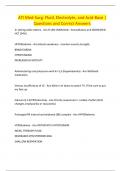
-
ATI Med-Surg: Fluid, Electrolyte, and Acid-Base | Questions and Correct Answers
- Exam (elaborations) • 4 pages • 2024
-
- $12.49
- + learn more
2+ pitting ankle edema - Ans FLUID OVERLOAD - hemodilution and DECREASED HCT (34%) HPYERkalemia - Ans Muscle weakness - monitor muscle strength; BRADYCARDIA HYPOTENSION INCREASED GI MOTILITY Administering oral potassium with K+ 5,5 (Hyperkalemia) - Ans Withhold medication
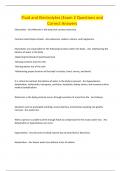
-
Fluid and Electrolytes (Exam 2 Questions and Correct Answers
- Exam (elaborations) • 7 pages • 2024
-
- $12.89
- + learn more
Electrolytes - Ans Minerals in the body that conduct electricity. Common electrolytes include - Ans potassium, sodium, calcium, and magnesium. Electrolytes are responsible for the following functions within the body: - Ans -Maintaining the balance of water in the body -Balancing the blood pH (acid-base) level -Moving nutrients into the cells -Moving wastes out of the cells -Maintaining proper function of the body's muscles, heart, nerves, and brain)
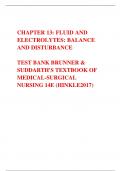
-
ATI Med Surg test questions Fluid and Electrolytes Balance and Disturbance
- Exam (elaborations) • 25 pages • 2024
-
- $15.49
- + learn more
Chapter 13: Fluid and Electrolytes: Balance and Disturbance You are caring for a patient who has a diagnosis of syndrome of inappropriate antidiuretic hormone secretion (SIADH). Your patients plan of care includes assessment of specific gravity every 4 hours. The results of this test will allow the nurse to assess what aspect of the patients health? Nutritional status Potassium balance Calcium balance Fluid volume status Ans: D Feedback: A specific gravity will detect if ...

$6.50 for your textbook summary multiplied by 100 fellow students... Do the math: that's a lot of money! Don't be a thief of your own wallet and start uploading yours now. Discover all about earning on Stuvia


